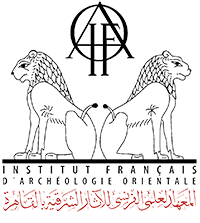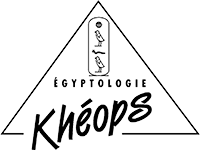CHARTER
Archéo-Nil
Head office
Collège de France
11 place Marcelin-Berthelot
75231 Paris cedex 05
Cette adresse e-mail est protégée contre les robots spammeurs. Vous devez activer le JavaScript pour la visualiser.
CHARTER
Archéo-Nil
Head office
Collège de France
11 place Marcelin-Berthelot
75231 Paris cedex 05
Cette adresse e-mail est protégée contre les robots spammeurs. Vous devez activer le JavaScript pour la visualiser.
1990 Charter
1) Jean Leclant Secrétaire perpétuel de l'Académie des Inscriptions et Belles Lettres – Professor at the Collège de France living in Paris
2) Béatrix Midant-Reynes living in Paris
3) Nathalie Buchez living in Paris
4) Patrick Gautier living in Paris
5) Jean-Claude L'Herbette living in Dingy·en Vuache (Haute-Savoie)
And all persons who will have adhered to the present charter,
Hereby form a Society (“association”) in accordance with the law of July 1, 1901, and establish the charter as follows:
ARTICLE 1 - DENOMINATION
Denomination is:
Archéo-Nil, Société pour l'étude des cultures pré-pharaoniques de la vallée du Nil.
ARTICLE 2 - AIM
This Society aims to:
1) The study of Pre-Pharaonic cultures of the Nile Valley in all its aspects and by all means: newsletters, lectures, exhibitions, conferences, etc. ....
2) Support to research and archaeological excavation expeditions, especially the archaeological expedition on the site of Adaima.
ARTICLE 3 – HEAD OFFICE
Its head office is in Paris, Cabinet d'Égyptologie du Collège de France - 11 Place Marcelin Berthelot 75005 PARIS.
The executive committe has the choice of the location where the head office is established and can transfer it to the same city by simple decision.
ARTICLE 4 – DURATION
Duration of the Society is unlimited.
ARTICLE 5 - MEANS OF ACTION
The Society's means of action are notably:
- the publication of one or more annual newsletters
- the organisation of any event related to the aim of the Society: lectures, conferences, exhibitions, symposiums, etc.
ARTICLE 6 - COMPOSITION, MEMBERSHIP FEES
The Society consists of:
1) honorary members, appointed by the executive committee or by the Annual General Meeting on the proposal of the executive committee, from among persons who render or have rendered services to the Society. They are part of the General Assembly without being required to pay an annual membership fee.
2) Founding members.
Are considered as such those who are at the origin of the chart of the assication whose names follow:
Jean Leclant - Secrétaire perpétuel de l'Académie des Inscriptions et Belles Lettres, Professeur au Collège de France
Beatrix Midant-Reynes
Nathalie Buchez
Patrick Gautier
Jean-Claude L'Herbette.
3) Benefactor members.
Benefactor members are those who pay an annual fee set each year by the executive committee or any amount in excess thereof.
4) Titulary members.
Titulary members are those who pay an annual fee set each year by the executive committee or any amount in excess thereof.
5) Associated members (experts, research centres, foreign archaeological expeditions, etc.).
The Society is under the honorary presidency of Jean Leclant.
ARTICLE 7 - CONDITIONS OF MEMBERSHIP
To become a member of the Company, it is necessary to be approved by the Executive Committee, which decides, at each of its meetings, on the applications for admission presented.
Membership is formulated in writing, signed by the applicant and accepted by the Executive Committee, which, in the event of refusal, does not have to state the reasons.
ARTICLE 8 - RESOURCES
The Society's resources consist of:
1) Membership fees;
2) Subsidies that may be granted by the Government or public authorities;
3) Income from its assets;
4) Amounts received in return for services provided by the Society;
5) Any other resources authorized by the legislative and regulatory texts.
ARTICLE 9 - RESIGNATION, STRIKING OFF
Membership in the Society is lost:
1) By resignation;
2) By death;
3) By the striking off pronounced by the Executive Board for non-payment of the fees or for serious reasons: in particular infringement of the present charter, moral or material damage to the Society.
ARTICLE 10 - ADMINISTRATION
The Society is administered by an Executive Committee composed of 4 members elected by secret ballot for 3 years during the Annual General Meeting and chosen from among its members:
a President
a Vice-President
a Secretary
a Treasurer.
In case of vacancies, the office provides temporarily for the location of its members. Their definitive replacement comes at the next general assembly.
The powers of the members thus elected come to an end at the time when the mandate of the replaced members should normally expire.
The renewal of the Executive Committee takes place in full every 3 years.
The outgoing members are eligible for re-election.
The first Executive Committee is composed of
President: Béatrix Midant-Reynes
Vice-President: Jean-Claude L'Herbette
Secretary: Nathalie Buchez
Treasurer: Patrick Gautier
It will retain the administration of the Society until the first Annual General Meeting, which will meet, at the latest, one year after the publication in the Journal Officiel.
ARTICLE 11 - MEETING OF THE EXECUTIVE COMMITTEE
The Executive Committee shall meet annually, and whenever called by its President or at the request of one-fourth of its members whenever the interests of the Society so require.
The presence of half of the members of the Executive Committee is necessary for the validity of the deliberations.
Minutes are kept of the meetings.
The minutes are signed by the President and the Secretary; they are recorded in a register, which is numbered and initialled by the prefect or his delegate whenever the nature of the decision so requires.
Decisions are taken by absolute majority; in the event of a tie, the president has the casting vote.
Any member of the Executive Committee who, without apologies, has not attended 3 consecutive meetings, may be considered to have resigned.
ARTICLE 12 - POWER OF THE EXECUTIVE COMMITTEE AND ROLES OF THE MEMBERS OF THE EXECUTIVE COMMITTEE
The Executive Committee is vested with the broadest powers to authorise all acts not reserved to the Annual General Assembly.
President: The president convenes the Annual General Meeting and the meetings of the Executive Committee.
He represents the Society in all acts of civil life and is vested with all powers to this effect.
In particular, he is entitled to sue and be sued in the name of the Company, both as plaintiff and defendant.
In the event of absence or illness, he is replaced by the vice-president, and if the latter is unable to attend, the president may delegate his powers to another member of the executive committee on the advice of the executive committee.
Secretary: The secretary is in charge of all correspondence and archives.
He draws up the minutes of the deliberations and ensures their transcription into the registers.
He keeps the special register, provided for by law, and ensures the execution of the prescribed formalities.
Treasurer: The treasurer is in charge of all that concerns the management of the Society's assets.
He makes all payments and collects all receipts under the supervision of the president.
He keeps a regular accounting, on a daily basis, of all the operations and reports to the General Annual Meeting, which decides on the management.
ARTICLE 13 - ANNUAL GENERAL MEETING
The Annual General Meeting includes all members of the Society in whatever capacity they are affiliated and up to date with their membership fees.
The Ordinary General Assembly meets every year.
At least fifteen days before the date fixed, the members of the Society are convened by the secretary. The agenda is indicated on the invitations.
The president, assisted by the members of the Executive Committee, presides over the meeting and exposes the moral situation of the Society.
The treasurer reports on his management and submits the balance sheet to the approval of the assembly.
It is proceeded, after exhaustion of the agenda, to the replacement of the outgoing members of the office.
All the deliberations of the Annual General Meeting are taken by a show of hands by an absolute majority of the members present. A secret ballot may be requested by the Executive Committee.
ARTICLE 14 - EXTRAORDINARY GENERAL MEETING
If need be, or at the request of half plus one of the registered members, the President may convene an Extraordinary General Assembly, in accordance with the formalities provided for in Article 13.
The General Assembly has an extraordinary character when it decides on any amendments to the charter. It may decide on the dissolution and allocation of the Society's assets, the merger with any Society with the same object.
Such a meeting must be composed of at least a quarter of the active members. It must be decided by a majority of three quarters of the votes of the members present.
Members unable to attend may be represented by another member of the Society, by means of a written power of attorney.
An attendance sheet will be issued and certified by the members of the Executive Committee.
If the quorum is not reached during the meeting of the assembly, on first convocation, the assembly will be reconvened by individual notice by an insertion in a local newspaper, at fifteen days interval, and, during this new meeting, it will be able to validly deliberate, whatever the number of members present.
ARTICLE 15 - MINUTES
The minutes of the deliberations of the meetings are transcribed by the Secretary on a register and signed by the President and a member of the Executive Committee present at the deliberation.
The minutes of the deliberations of the Executive Committee are transcribed by the secretary into a register and signed by the Secretary and the President.
The Secretary may issue any certified copies which are authentic vis-à-vis third parties.
ARTICLE 16 - DISSOLUTION
Dissolution of the Society may only be decided by the General Assembly, convened specifically for this purpose and voting under the quorum and majority conditions provided for extraordinary meetings.
The General Assembly’ Meeting shall appoint one or more auditors responsible for the liquidation of the Society’s assets, whose powers it shall determine.
It allocates the net assets to any association declared to have a similar purpose or to any public or private institution recognised as being in the public interest, of its choice.
Done in PARIS on May 14, 1990

















